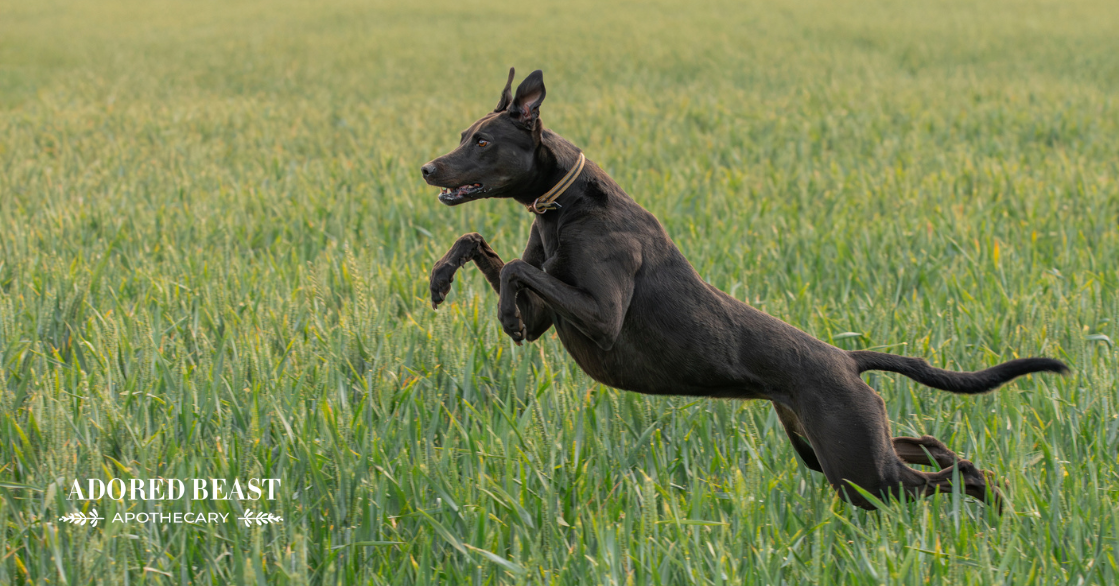Never in my life did I think I would get so excited about sh~t. And when I say sh~t, I don’t mean “stuff” – I actually mean sh~t!
OK, all kidding aside, I can honestly say I never dreamt how immersed I would become in poop and all it entails: good bacteria, bad bacteria, the microbiome, prebiotics, dysbiosis, canine probiotics…
There’s a huge amount of new information and research coming out weekly, if not daily!
Poop is Powerful
In 1994 when I was at college doing my human homeopathic medicine program, I was always so grossed out by the close attention paid by homeopathic and medical doctors to “stool.” Yuk! It still makes me gag to think of human poop, but just let me get my hands and microscope on dog, cat, horse, cow, or chicken poop and I am happy as a pig in you-know-what! Maybe that’s why I don’t treat people and prefer to focus on the health of animals.
It might sound like I’m making light of this, but the truth is that research is finally showing the vital importance of a healthy gut and how so much chronic disease in humans, including mental illness, is directly linked to gut health.
For me, this research is preaching to the converted, but it’s now such a hot topic in medical science, the intricate details of just how the bacteria in the gut work is mind-blowing. I’m completely obsessed with all of those details as they unfold.
Just to show you how far this has come, in 2005, I wrote an article for the Vancouver Sun about the benefits of probiotics for dogs and cats. The Veterinary Association forced me to write a retraction saying that there’s no research supporting the benefits of probiotics and that the Vet Association didn’t support their use in animals. Now they support a vet probiotic made by Purina. Yikes! But at least it’s progress.
Do Animals Know Best?
Our animals are so smart and can teach us so much if we just pay attention. Thank goodness we’re now learning more and more why our animals do the things they do. We’re trying to understand what they’re telling us or showing us.
In the late 80s, when drug companies started making products to change the taste of dogs’ feces to stop them from eating their own poop, they didn’t stop to wonder what was behind the poop-eating; it was just considered a neurotic behavioural issue – and some vets still believe this.
What if the gut of the poop-eating dog is unhealthy and losing major nutrients passed through his stool? What if the dog instinctively knows that he needs that nutrition or the good bacteria from the stool? What if the so-called behavioural problem actually stems from the gut-brain axis?
Why do dogs eat rabbit poop, horse poop, cow poop? It’s absolutely not a stretch to assume they know it’s packed full of friendly, beneficial bacteria. My dogs eat horse manure like it’s going out of style, but it never makes them sick (unless they eat it frozen like a poopsicle then graciously throw it up in the house – I kinda draw the line at my love of poop there). But it makes total sense that they seek out and eat what they need the best way they can, because they’re lacking the healthy gut flora that is the cornerstone of their immune system, digestion and ultimately their longevity.
You can feed the absolute best nutrition on the planet, but without a healthy gut, much of that nutrition goes to waste along with the time, money, and concern you spend getting the right food for your dog’s optimal health.
Canine Probiotics: The Basics
Before I tell you about the exciting next generation of canine probiotics, here’s some key background on probiotics (and their importance for your dog) for those of you who have a life outside researching gut health!
Pet food manufacturers are adding probiotics to pet food, mostly driven by marketing claims, with apparent disregard for any scientific rationale for including probiotics in the first place.
Over 80 percent of the immune system comes from the gut and the vast majority of microorganisms exist within the digestive tract. A normal digestive tract contains both “good” and “bad” (pathogenic) bacteria. Digestive or intestinal upsets, as well as a wide variety of diseases or conditions, can cause the digestive tract to become “unbalanced.” Pathogenic bacteria then take over the environment, overwhelming the “good guys” and creating poor gut health.
It’s estimated that bacteria account for 0.5 to 1 percent of our (or our pets’) body weight. For a 150 lb person that means ¾ to 1.5 pounds of bacteria. For a 20 lb dog, the estimate is 0.1 to 0.2 pounds. One-tenth of a pound of bacteria equals billions and billions of organisms!
What’s Harming The Gut?
There are many things that damage the gut environment and create much of the chronic disease we see in our dogs today. This includes:
- antibiotics
- non-steroidal anti-inflammatories and steroids
- over-vaccination
- processed food
- stress
- grains or beans (anything with lectins)
Gut imbalance can result in reduced food digestion and vitamin production (especially vitamins B and K) and can lead to serious malnutrition. Gut imbalance can also make your dog susceptible to infection by harmful bacteria, and a poor microbiome can result in a weakened immune system.
Digestive disorders like inflammatory bowel disease (IBD), chronic or life-threatening diseases like cancer and autoimmune disease (including skin disease and hypothyroidism) can all be linked to an unhealthy gut.
The intestinal balance of microorganisms performs many functions, including:
- fermenting dietary fiber
- synthesizing vitamins
- modulating the immune system
- limiting the growth of harmful organisms
- producing hormones that support metabolism and neurological functions
Intestinal microorganisms adapt as a result of diet, age, exposure to antibiotics and other drugs.
With that little review of probiotic basics, let’s talk about how research is now starting to develop a new generation of probiotics, specifically for dogs!
Species-Specific Bacteria
There’s no doubt that good quality probiotics on the market are empirically beneficial for your dog. For years, we’ve seen positive changes in the gastrointestinal tract, energy, and skin. Yet one of the problems with current probiotics for dogs is that the research has always been done on humans, and we really don’t know which bacterial strains are best for dogs. That’s why you’ll see probiotics for dogs with high colony forming units (CFUs) and dozens of different human strains of bacteria that match the corresponding canine pathology, in the hope that they colonize in the canine gut. Because dogs’ digestive tracts are quite different from ours, we’ve never really been sure that existing probiotic strains can withstand the activity, acidity and environment of a dog’s gut.
But now that’s all changing, with ground-breaking new research that has analyzed dogs’ own feces to identify which bacteria are beneficial for dogs. (See why love poop?)
Probiotic bacteria evolve host-specific traits – meaning you want to find a strain or strains that have optimum efficacy for the host, body or species it’s intended for.
We now know that while there is some commonality of intestinal bacteria between species, each species of animal has its own specific microflora.
It’s just intuitive, as well as scientifically correct, that ideally our companion animals would be given probiotics that were developed with their best interests in mind. So naturally I wanted to delve into research to make sure that probiotics for dogs are biologically appropriate, have beneficial properties and can be easily incorporated into a daily diet or given as a dietary supplement.
I’ve been working with a diversified team of experts in veterinary medicine, food microbiology, medical microbiology and immunology, food and nutritional science who set out to do just that. This science has borne out that species-specific probiotics for our animal companions are worth aspiring to and would have the following specific features.
Host Specific Traits
- Survive gastric acid digestion when taken orally.
- Improve digestion and production of key metabolites.
- Positively impact the immune system.
- Support the gut-brain axis (positively influence the neurological system).
- Produce substances (inhibitory metabolites) that impair the growth of harmful bacteria such as clostridia, salmonella and E. coli (hopefully supporting the feeding of raw food diets to skeptics).
- Do not contribute to antibiotic resistance.
- When given regularly, help support the digestive system as well as re-establish a healthy gut after disease or distress.
They exist!
The bar has been raised through the development of biologically species-appropriate probiotics for companion animals. And yes, that means your dog!
These probiotics of canine (poop) origin have been isolated and further developed. They’ve been replicated and grown in human grade fermentation facilities for quality control and assurance, and they’ve been tested in feeding trials. They’re also combined with prebiotics to maximize their potential to positively colonize and stabilize in the gut of your dog.
I’m sure you’re all skipping and jumping around your living room after reading this – or maybe that’s just me! But seriously, we all know the importance of species-appropriate diets for our dogs, so why wouldn’t we all be over the moon that a species-appropriate probiotic has been isolated?
This research is about probiotics and foundational health, but it’s opened the door to many more exciting formulations that’ll be specifically species-oriented for your dog.












